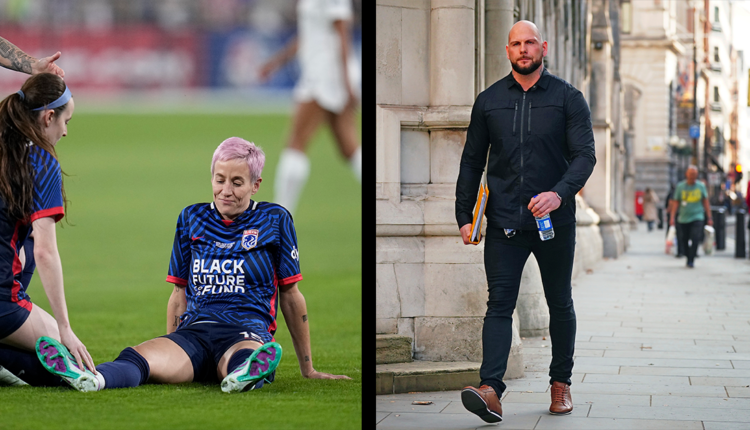A Tale of Two Tragedies
As Rapinoe peruses the articles about herself, wallowing in self-pity, maybe the timely story of Indi Gregory’s father will pop up.
Megan Rapinoe tears Achilles in final match of career
Megan Rapinoe spent a significant portion of her professional soccer career as a political analyst and activist, so perhaps it’s only fitting she begins her retirement as a religious philosopher.
Within three minutes of the starting whistle in the final match of her nine-year career, she suddenly toppled over, untouched by anyone else. The 38-year-old forward had suffered an Achilles rupture, not uncommon among athletes, but excruciatingly painful. (Just ask, most recently, New York Jets quarterback Aaron Rodgers.)
Rapinoe limped off the field with one final wave to her fans in the stands.
Later, the purple-haired Rapinoe spouted a rationalization for her injury that was, even by her standards, beyond obnoxious.
“I’m not a religious person or anything and if there was a god, like, this is proof that there isn’t,” Rapinoe said. “This is f—ed up. It’s just f—ed up. Six minutes in and I eat my Achilles.”
Almost on cue, the trolls of the Internet lit up, claiming—also incorrectly—that proof of God’s existence lies in this bad thing happening to a bad person. The Free Beacon even published a satirical piece from God’s point of view, claiming the injury was an act of divine wrath. Anything is possible, but, likely it was only a humdrum torn Achilles.
Along with a litany of other clichés the queer soccer star fits perfectly, the self-centered millionaire athlete cannot seem to grapple with the age-old problem of pain. How fitting that, of all the possible inflictions on the thought-to-be invincible athlete, it was not a collision with another player or a ball to the face that flattened her once and for all.
It is the Achilles tendon that led to Rapinoe’s demise.
Mother and father say goodbye to infant daughter, Indi Gregory
Rapinoe’s foil emerged in the news cycle about 24 hours later.
Dean Gregory, the father of 8-month-old Indi Gregory, shared his own excruciatingly emotional pain of having to say goodbye permanently to his infant daughter after life support was ended.
Dean and Indi’s mother, Clare, would have chosen to keep Indi under medical watch and care at Queen’s Medical Center in Nottingham, but England’s government-sponsored healthcare system ruled that removing her breathing tube was “in her best interest.” Little Indi, suffering from a rare mitochondrial disease, was moved to hospice on November 11 and died the following night.
Christian Concern, a non-profit advocacy group in the U.K., released a statement:
Gregory’s parents said they “are angry, heartbroken, and ashamed. The NHS (National Healthcare Service) and the courts not only took away her chance to live a longer life, but they also took away Indi’s dignity to pass away in the family home where she belonged.”
After learning of the British government’s barbaric decision to let the little girl die, Italy swiftly granted Indi citizenship and invited her family to transfer her to the Vatican’s pediatric hospital, Bambino Gesù.
Gregory and Clare repeatedly petitioned British courts to allow the transfer of their baby to a hospital that would not give up on her. Moreover, no funds spent on the transfer would have come from UK taxpayers.
England’s National Health Service said no.
The Gregorys insinuated to the National Catholic Register that the NHS never cared about their daughter and her disability. Under socialized healthcare, you are not a person. You are an occupied bed, an unavailable room, a line item on the government’s budget.
Prior to Indi’s birth, several routine ultrasounds showed fluid in the Indi’s brain, and British doctors, wary of the potential cost of another baby in the NICU, pressured the couple to abort.
Dean Gregory could have chosen the path of Megan Rapinoe, hopping behind a microphone to spew woe-is-me complaints about all the bad things happening to him, how no good can come out of tragedy. He could have refused to share the agony of watching his baby suffer among physicians who could not care less what happened to her.
Frankly, no one would have blamed him if he had.
Instead, Gregory chose to make something good come from the pain he and Clare experienced, sharing the miracle that came out of his family’s darkness. Dean Gregory, formerly areligious and unbaptized, chose to christen his daughter in the weeks leading up to her death.
A Christian volunteer visited the neonatal intensive care unit where the Gregory family–on days when they weren’t filing court documents—spent time with their daughter. It was during those visits, Gregory explained, that he was introduced to the idea of baptism.
“I’ve seen what hell is like, and I want Indi to go to heaven,” he realized.
Indi was baptized in September, and Dean now plans to be baptized himself as well.
Comments like Megan Rapinoe’s will dominate headlines in a world seduced by claiming victimhood.
But as Rapinoe peruses the articles about herself, wallowing in self-pity, maybe the timely story of Indi Gregory’s father, who fought for the dignity of his child and the rights of every future parent in a similar scenario, will pop up in her feed.





